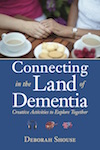Posts Tagged ‘Signpost Journal’
Redefining Dementia and Focusing on Wellbeing
Several months ago, I was delighted to write an article highlighting some of the American leaders in dementia care. I will be occasionally spotlighting luminaries from that article who are redefining dementia and focusing on wellbeing.
A version of this piece appeared in Signpost Journal: Journal of Dementia and Mental Health of Older People. This excellent journal from Wales, UK, offers a variety of informational and inspirational articles. I am honored to be a contributor.
Redefining Dementia and Focusing on Wellbeing
Late every afternoon, Roger paces the corridors, pausing at the locked door, fiddling with the keypad, sometimes even setting off the alarm before he resumes his pacing. Instead of labeling Roger’s behavior as “sun downing,” Allen Power, MD, teaches practitioners to ask themselves: Which vital element of health and happiness is missing from Roger’s life: identify, connectedness, security, autonomy, meaning, growth, and joy. By doing this, Dr. Power is redefining dementia and focusing on wellbeing.
Dr. Power is a geriatrician and educator on transformational models of care, with a focus on people living with changing cognitive abilities. He is also the author of two groundbreaking books, Dementia Beyond Drugs and Dementia Beyond Disease: Enhancing Well-Being.
He defines dementia as, “A shift in the way people experience the world around them.”
“I believe that most of people’s on-going distress is due to the erosion of one or more aspects of well-being, from the care environment, and/or the person’s cognitive changes. Imagine these domains of wellbeing as seven glasses being emptied. Start filling the glasses and notice the results.”
As Dr. Power trains and consults with memory care communities around the world, he sees meaningful results from this compassionate approach. Suddenly, Mary is not constantly calling out night and day. Bill is not hitting the aides when they take him to the shower. Roger is not setting off the alarm or trying to open the exit door.
“There’s no sure answer,” Dr. Power says. “You need to understand the individual and experiment until you reach the root of the problem. People may be looking for connectedness. They may feel anxious and insecure. They may be bored.”
If someone is repeatedly trying to leave the building, Dr. Power might ask: Are they feeling insecure? Are they feeling lonely and trying to reach someone they love? Are they yearning to connect with an important part of their identity, such as a beloved garden, horse, dog, or pick up truck?
Working toward an Inclusive Future
Dr. Power uses a strength-based approach to work on enhancing wellbeing. He encourages developing “brain ramps,” cognitive supports that help people move through the day in meaningful ways.
“With this positive approach, I can now look at a challenging scenario and offer insights,” Dr. Power says.
Beyond the care of the individual, Dr. Power believes in examining ingrained rituals and routines of institutionalized care, including all meals at a certain hour, with an aim of moving to a more individualized and meaningful mode of care.
“We can make mundane activities such as bathing or getting ready for bed more meaningful and relational than we normally do in long-term care,” he suggests.
“We need to support people instead of dehumanizing them,” he says. “We need to be inclusive and try harder to understand them.”
Dr. Power believes integration into society is a basic civil right.
“Imagine if people who lived with cancer, arthritis, or diabetes could only live with others who shared their medical condition. There’s a problem with seeing the disease instead of the people,” he says.
Dr. Power is contributing to a future where all communities are dementia inclusive and where dementia is just viewed as another way that people see the world.
For more about Allen Power, MD, internationally known geriatrician, educator, and author , please visit:
Website: http://www.alpower.net
Dr. Power is participating in Dementia Action Alliance’s Reimagine Life with Dementia Conference, June 25-27.
http://daanow.org/wp-content/uploads/2016/10/DAA-Conference_042817.pdf
Deborah Shouse is the author of Connecting in the Land of Dementia: Creative Activities to Explore Together and Love in the Land of Dementia: Finding Hope in the Caregiver’s Journey.


